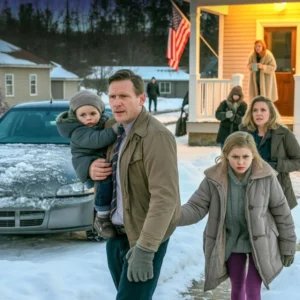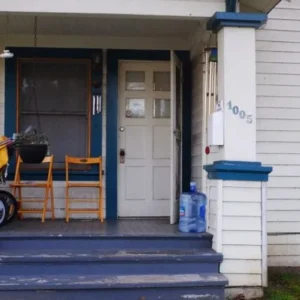I was her father. Her protector. No matter what differences existed between Laura and me, our daughter’s safety was sacred.
The next morning, I decided to talk to Laura—not as a police officer, but as a concerned parent. I kept my tone calm, factual, and non-accusatory. She seemed surprised by my concern, dismissing my worries as “overprotectiveness.” She told me Nathan was just trying to teach Sophie to be “tough and confident.”
Her response didn’t sit right with me.
Confidence doesn’t come from fear—it grows from love, encouragement, and understanding. Still, I knew that emotional persuasion wouldn’t work in this situation. I needed facts.
Clear, undeniable evidence that could protect my daughter without escalating the conflict unnecessarily. Taking the First Step
That afternoon, after a long internal debate, I made a call to a colleague who specialized in family and child protection. I didn’t give details immediately; I just needed guidance.
We spoke about procedure—what qualified as a safety concern, what signs to document, how to approach the situation ethically and legally. By the time the conversation ended, I had a plan. Not a plan of revenge or confrontation, but one of protection and truth.
I scheduled an appointment for Sophie to talk to a licensed counselor—someone trained to recognize emotional distress in children. I framed it as a fun meeting where she could share stories and feelings. Sophie was hesitant at first, but eventually opened up to the gentle encouragement of the counselor.
Over the next few sessions, bits and pieces emerged. Nothing alarming in isolation, but together they formed a picture that couldn’t be ignored. Sophie described feeling “scared to make mistakes,” saying Nathan “gets upset easily” when she doesn’t follow instructions.
I felt my chest tighten. Every fiber of my being wanted to storm into their house and demand answers, but I restrained myself. Impulsiveness could backfire—not only legally, but emotionally for Sophie.
Instead, I began following the official path: documenting, reporting, and consulting with professionals. When the System Becomes Personal
It’s strange being on the other side of a case file. Normally, I’m the investigator, guiding parents through the process, helping them find justice.
Now, I was the one waiting for updates, paperwork, and official decisions. Child Protective Services (CPS) handled the case with professionalism. When I finally made the call, my voice was steady, but inside, I was trembling.
The report was logged. Statements were taken. A review process began.
At home, I tried to keep life as normal as possible for Sophie. We painted together, took long walks with Max—our overly energetic Labrador—and watched old cartoons until she fell asleep on the couch. I wanted to remind her that not all adults made her feel small or scared.
Some would always stand by her side, no matter what. In moments of quiet, I reflected on how many parents must go through similar experiences, trapped between love and helplessness. It’s one thing to enforce justice professionally; it’s another to live it personally.
Facing Laura
When the formal discussions began, Laura and I sat across from each other in a small meeting room. The air was thick with tension. A mediator guided the conversation, ensuring it stayed calm and productive.
I spoke clearly and respectfully. My only focus was Sophie’s well-being. Laura listened, her face shifting between confusion and frustration.
She believed Nathan was simply being “firm” and “disciplined.”
But firmness and fear are not the same thing. I tried to help her see that. The mediator encouraged her to cooperate with the investigation and attend family counseling.
Laura reluctantly agreed, though I could see the conflict behind her eyes. In that moment, I didn’t feel anger toward her—just sadness. Relationships are complicated, and people often see what they want to see, especially when love is involved.
A Father’s Mission
Weeks turned into months. The legal process moved slowly, as all such matters do. But through it all, Sophie began to heal.
Her laughter returned. She began painting again, often drawing bright suns and smiling faces. Every brushstroke was a victory, every giggle a sign of recovery.
I realized then that my role wasn’t only to protect her from harm—it was also to rebuild her trust in safety, to teach her that love could be gentle, patient, and kind. We spent weekends visiting the countryside, hiking trails, and taking pictures of birds. I made it a mission to show her a world beyond fear—one full of color, warmth, and belonging.
At night, when she fell asleep clutching her stuffed rabbit, I’d sit by her door for a few minutes, just to be sure she was okay. Those moments reminded me that parenthood isn’t about perfection—it’s about showing up, even when it hurts. Redefining “Toughness”
Over time, I began reflecting deeply on that phrase Nathan had used—“toughening up.” It haunted me.
What does it really mean to be tough? To me, real toughness isn’t about hiding emotions or enduring pain in silence. It’s about resilience.
The ability to rise after being knocked down, to choose compassion when bitterness seems easier, to protect without hurting. I wanted Sophie to learn that kind of strength—the quiet, courageous kind that grows from kindness and confidence. So, we started martial arts classes together.
Not to fight, but to build discipline, focus, and self-esteem. She loved it. The look of pride on her face each time she mastered a move was priceless.
It wasn’t fear driving her anymore—it was empowerment. The Resolution
Eventually, the results of the investigation came in. While the findings didn’t suggest any ongoing danger, they confirmed that certain disciplinary practices at Laura’s home were inappropriate.
Counseling was mandated, and a new custody arrangement was proposed. It wasn’t the dramatic courtroom victory you see in movies—but it was enough. Sophie’s safety was ensured, and boundaries were set.
Laura, to her credit, began attending family therapy sessions. I could see slow but genuine change taking place. Perhaps she, too, was realizing what it truly meant to protect a child—not through harshness, but through empathy.
Nathan eventually withdrew from active parenting, focusing more on his work. I didn’t need to say much; reality had spoken for itself. Healing Together
Months passed, and the chaos settled into calm.
Sophie’s world began to look brighter again. She started writing small stories about brave girls and kind heroes. One evening, while reading her bedtime story, she looked up and asked, “Daddy, what does brave mean?”
I smiled, brushing a strand of hair from her forehead.
“Brave,” I told her, “means doing what’s right, even when it’s hard. It means standing up for yourself and for others.”
She thought about that for a moment, then nodded seriously. “Like you did for me?”
That simple question broke me a little—and healed me at the same time.
“Yes, sweetheart,” I whispered. “Exactly like that.”
The Lesson That Lasted
Looking back now, I realize that this experience changed both of us. Sophie learned the value of self-worth and trust, and I learned the true meaning of strength.
Being a father isn’t about control or authority—it’s about presence. It’s about guiding your child through darkness and showing them how to find light. Sometimes, life places us in situations where our love is tested, our patience stretched thin, and our courage questioned.
But those moments also remind us of why we fight so hard—to protect innocence, to defend truth, to nurture hope. Sophie’s laughter now fills the house again. Her paintings hang on the refrigerator door, each one brighter than the last.
Every stroke of color is a declaration: I’m okay. I’m safe. I’m loved.
And for me, that’s all that matters. Final Thoughts
What started as a moment of confusion turned into a journey of rediscovery—for both father and daughter. Through compassion, persistence, and trust in the system, we found a way forward.
Today, when I look at Sophie running in the yard with Max chasing after her, I no longer see the fear that once clouded her eyes. I see strength. The real kind.
The kind born from love, honesty, and healing. And I silently promise her, every single day:
No matter what challenges life brings, she will never face them alone again.





